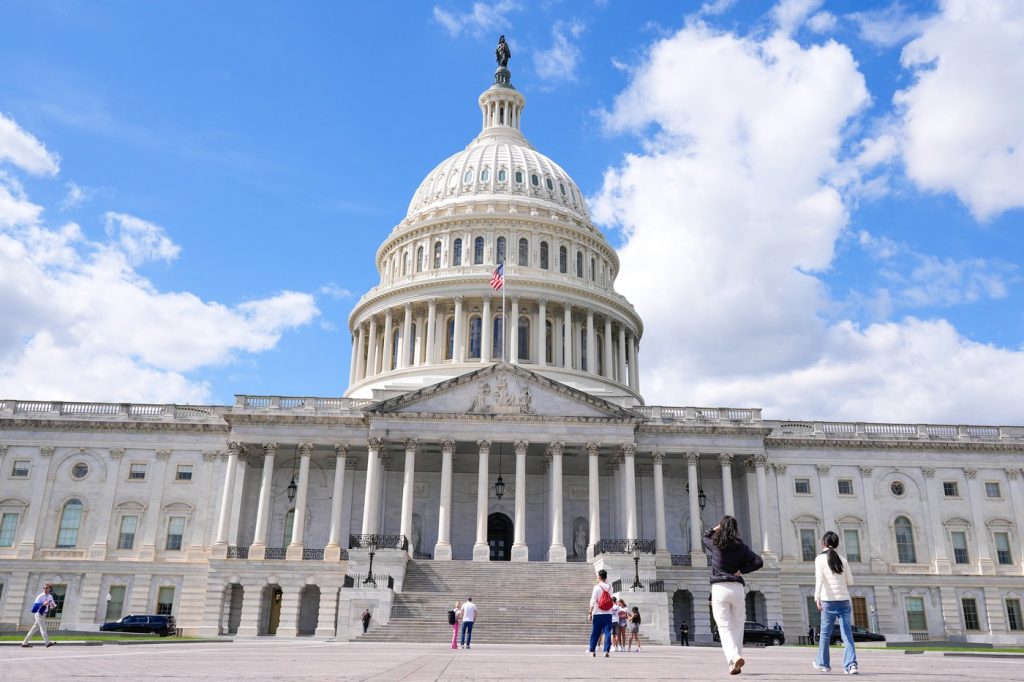World
Political Battle Over Government Shutdown Shapes 2026 Election

Political tensions are escalating in Washington as leaders from both parties engage in a heated blame game surrounding a potential government shutdown. The looming crisis is not only about funding but also plays a significant role in shaping narratives ahead of the 2026 elections. The Democratic Congressional Campaign Committee (DCCC) has initiated digital ad campaigns in 35 competitive districts, accusing Republicans of obstructing access to affordable health care. These ads emphasize the urgency of addressing health coverage concerns as part of any government funding agreement, a demand that Republicans have consistently dismissed.
In addition, the Democratic-aligned group, House Majority Forward, has launched a substantial advertising campaign worth $3 million targeting ten Republican-held districts. Meanwhile, the House Republican campaign organization has responded with its own digital advertisements in swing districts. One such ad claims, “It’s sabotage. Democrats are threatening a government shutdown to stop President Trump’s policies.” Concurrently, conservative groups like One Nation and the American Action Network are also making their voices heard through advertising in key markets, framing the shutdown as a result of what they describe as a “woke mob” demanding drastic measures.
As the balance of power in Congress hangs by a thread, both parties recognize the importance of controlling the narrative surrounding the shutdown. While the current political landscape suggests that the shutdown is unlikely to significantly impact the upcoming elections, historical precedents provide a mixed record.
Historical Context of Government Shutdowns and Elections
The October 2013 government shutdown serves as a pivotal example of the political ramifications of such crises. During that shutdown, which lasted for 16 days, Republicans leveraged the situation to demand substantial changes to the Affordable Care Act. Doug Heye, who served as deputy chief of staff to then-House Majority Leader Eric Cantor, recalls concerns within GOP leadership about the potential political fallout. Despite initial confidence among some Republican senators, the shutdown ultimately backfired, leading to significant electoral losses for the party shortly thereafter.
“Voters tend to have short memories on this,” Heye noted. “Unless a shutdown becomes protracted and begins to affect voters on a personal level, the electoral fallout will probably be minimal.” Indeed, in the following year’s elections, Republicans gained 13 seats in the House and nine seats in the Senate, reclaiming the majority.
In contrast, the aftermath of the 2018-2019 partial shutdown, which lasted for 35 days, produced mixed results. The shutdown stemmed from a standoff over funding for President Trump’s proposed border wall. Ultimately, Trump conceded to Democratic demands, which called for reopening the government first before negotiating border security. The ramifications of this shutdown were obscured by the subsequent 2020 presidential election, which was dominated by the COVID-19 pandemic.
The limited impact of these recent shutdowns on subsequent elections suggests that the immediate effects might dissipate over time. Yet, a prolonged and contentious shutdown could alter this dynamic, especially if it begins to affect the daily lives of voters.
Current Political Messaging and Election Strategies
Both parties are keenly aware that the current situation offers a chance to reinforce their core messages. For the Democrats, health care remains a central issue. With millions of Americans facing rising health insurance costs next year, the party is emphasizing the necessity of extending tax credits to make premiums more affordable. Washington Representative Suzan DelBene, chair of the DCCC, stated, “The No. 1 issue across the country is affordability and rising prices.” She highlighted the disconnect between Republican promises and reality, asserting that voters will remember these broken commitments as they head to the polls.
Conversely, Republicans are shifting the narrative to immigration, asserting that Democrats are prioritizing illegal immigration over government operations. The National Republican Congressional Committee has framed their messaging around the idea that Democrats are holding the government hostage to advance their immigration agenda. North Carolina Representative Richard Hudson, chair of the House Republican campaign arm, characterized the shutdown as “wasteful and unnecessary,” placing responsibility for the impasse squarely on the Democrats.
As both parties prepare for a significant electoral battle in the coming years, the outcome of the current shutdown negotiations may well serve as a bellwether for their respective fates. With narrow margins dictating control of Congress, each party’s strategy will continue to evolve as they aim to capture the public’s attention and support as the 2026 elections draw nearer.
-

 Politics4 weeks ago
Politics4 weeks agoSecwepemc First Nation Seeks Aboriginal Title Over Kamloops Area
-

 World5 months ago
World5 months agoScientists Unearth Ancient Antarctic Ice to Unlock Climate Secrets
-

 Entertainment5 months ago
Entertainment5 months agoTrump and McCormick to Announce $70 Billion Energy Investments
-

 Science5 months ago
Science5 months agoFour Astronauts Return to Earth After International Space Station Mission
-

 Lifestyle5 months ago
Lifestyle5 months agoTransLink Launches Food Truck Program to Boost Revenue in Vancouver
-

 Technology3 months ago
Technology3 months agoApple Notes Enhances Functionality with Markdown Support in macOS 26
-

 Lifestyle3 months ago
Lifestyle3 months agoManitoba’s Burger Champion Shines Again Amid Dining Innovations
-

 Top Stories2 months ago
Top Stories2 months agoUrgent Update: Fatal Crash on Highway 99 Claims Life of Pitt Meadows Man
-

 Politics4 months ago
Politics4 months agoUkrainian Tennis Star Elina Svitolina Faces Death Threats Online
-

 Sports5 months ago
Sports5 months agoSearch Underway for Missing Hunter Amid Hokkaido Bear Emergency
-

 Politics5 months ago
Politics5 months agoCarney Engages First Nations Leaders at Development Law Summit
-

 Technology5 months ago
Technology5 months agoFrosthaven Launches Early Access on July 31, 2025





















